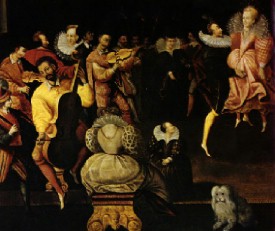Merry and mirthful songs repeatedly caper through “As You Like It”, with blithe, bucolic lyrics that suggest what the modern ear can no longer hear. Whatever melodies, tones, and textures Shakespeare envisioned have mostly evaporated under the sweep of time, and an unaided imagination tends to flop short in grasping the succinct levity of these songs. The thumping, pounding rhythms of modern pop and rap music are a poor mental substitute for whatever non-textual effects Shakespeare desired in his musical insertions, and so the task of replaying Shakespeare is not an immediately easy one.
Category Archives: category-in-waiting
How DO you like it?
During the Elizabethan era, women were not allowed to be on the stage. Acting was a crude career choice, and it was unthinkable that a woman could ever pursue such a thing.
Misogyny in 1 King Henry IV
In her essay “Taming the Shrew Within: Internalized Misogyny in Shakespeare’s 1 Henry IV”, Sarah Christy seeks to point out and analyze examples of misogyny within the titular play. Rather than simply sum up her arguments, I’d like to critique a few as well, because I think she is stretching to make a couple of her points. Continue reading
What is History?
Absorbing national history into crafted play with characteristic ingenuity, Shakespeare exposes the idiosyncratic quality of historical construction. To substantiate the narrative bulk of 1 King Henry IV, Shakespeare used the Holinshed Chronicles, an ambitious record of English history published in the late sixteenth century. Departing from the Chronicle’s narrowed occupation with succession, war and insurrection — cue Marx: “the ideas of the ruling class are in every epoch the ruling ideas” — the play includes a distinctive breadth that initiates an interrogation of the historical subject.
Henry IV: Never Seen but Wondered At
Many scholars have pointed out that the possibilities of protagonists in Shakespeare’s 1 Henry IV include all of the major players except for the King himself, though few actually address it. Robert Fehrenbach, in an essay titled The Characterization Of the King in 1 Henry IV, analyzes what makes him such a distant character in the play. Continue reading

A good king curbs internal insurrection in his state, or, at the very least, stomps it out efficiently when it does arise. This protocol is not just for the king’s self-interested stake in maintaining his power, but also for the greater good of preserving stability and security for his subjects. Machiavelli dictates that a king must be willing to do what needs to be done, despite the moral ambiguities, to hold onto his authority and successfully run a flourishing and stable kingdom. Political theorist Michael Walzer elaborates on this Machiavellian concept in The Problem of Dirty Hands. Walzer explains, “sometimes the precepts and principles of an ordinary man, the products of his moral education, come into conflict with injunctions developed at a higher level of moral discourse” (Walzer, 160). This higher level of moral discourse typically consists of questions of the common good over the individual. But, by floundering over tough decisions that protect the kingdom’s security and liberty, a leader “not only fails to do the right thing (in utilitarian terms), he may also fail to measure up to the duties of his office” (Walzer, 161). Continue reading

You Win or You Die
… when you play the Game of Thrones. The similarities between Shakespeare’s Henry IV Part I (1H4) and George R.R. Martin’s Game of Thrones (GoT) are uncanny, and have not gone unnoticed. With the BBC’s Hollow Crown mini series, which featured 1H4 in the second episode, there was a surge in comparisons between the play and Martin’s books and the resulting HBO series; dozens of news articles and reviews reference the two works of literature in connection with each other. But are these comparisons founded in real similarities in the texts? Beyond turbulent monarchies, and violent battles what do GoT and 1H4 actually have in common?
Hal, The Prodigal Son

Some scholars see Shakespeare’s Henry IV Part I as having drawn much inspiration from the biblical parable of the prodigal son. Found in the Book of Luke in the New Testament of the Bible, the prodigal son story speaks of a father and his two sons whom both receive their father’s inheritance. While the elder brother stays behind and dutifully serves his father, the younger son leaves home and goes on to squander his entire inheritance. The younger son returns to his father and begs for forgiveness for his rash behavior. The father takes his younger son willingly in his arms and even orders a banquet to celebrate his younger son’s return. The older son, offended that he never received such attention despite living life dutifully, refuses to attend the banquet. The father then says: “But we had to celebrate and be glad, because this brother of yours was dead and is alive again; he was lost and is found” (Luke 15:32 NIV version).
In Henry IV Part I, we see some similar overtones; Henry V, Prince of Wales, or more affectionately known as “Hal”, spends his time in sketchy taverns with those of lower birth. Influenced by the disgraceful Falstaff, Henry IV scorns Hal’s behavior as ill-fitting and inappropriate. Hal eventually tries to prove himself worthy of being heir to the kingdom, and transforms into the regal and responsible prince who triumphs over his father’s enemy, Harry Percy, nicknamed “Hotspur.” Shakespeare even includes a second and younger son in the play, John of Lancaster, as the more dutiful of Henry IV’s children to act as a contrast to Hal’s debaucherous attitude. While the seniority has been reversed, the roles are still the same: Hal, the prodigal son, and John of Lancaster, the dutiful one.
A Bard’s Own Tongue- Early Modern English
In Shakespeare’s time, English was in a particular state of flux. The lexicon was flurrying with pronunciations, dialects, spellings, and grammatical, unchecked by mass literacy and printing that current readership presumes. A modern likely won’t see in the innocuous, slightly archaic print of a Shakespeare script that Shakespeare’s pen transcribed the frenetic phonetics of Renaissance-era English. And while mediocre actors might feign a haughty British accent, or prolong syllables as though Shakespeare intended his plays for a race of droning sloths, really such sounds would be as foreign to Shakespeare’s audience as they are to the modern layman. Continue reading
Jessica and Shylock
Jessica is doubly distinguished. Unlike her father, Shylock, she is said to be gentle; at once noble and gentile. Yet, she remains a daughter to Shylock’s blood despite her conversion. According to Mary Metzger, representations of Jessica turn on alternating characterizations of her as a latent Christian and as a racialized and thus unintegrable Jew. Until recently, discussions of race or Jewishness in the Merchant tended to focus on Shylock, thus ignoring the intersection of religion, gender, and class. Metzger argues that, in order to elucidate The Merchant’s relation to early modern England’s emerging ideology of race, attention must be paid to the shifting emphases on discourses of gender, class, and religion in Shakespeare’s representation of Jessica. Continue reading


